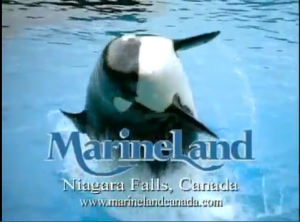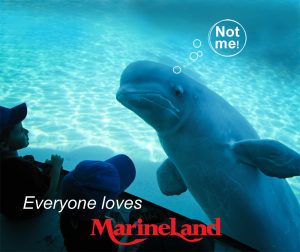

(Original advertisements, MarineLand)
Analysis of Advertisements:
MarineLand is a popular amusement park that features marine life including orca whales, dolphins, and belugas in Toronto, Canada. Marketed to the public as a friendly family-inclusive event for people to have fun and interact with large sea animals, MarineLand can be conceptualized as the hybrid between Disneyland and an aquarium.
What I will be critiquing is the misguided notion that “MarineLand” is a convivial place for “everyone”. In Mark Derry’s essay titled “Culture Jamming: Hacking, Slashing, and Snipping in the Empire of Signs”, the reference to “guerilla semiotics” incorporates multiple ways to evoke feelings in advertisements. Derry states that “images, gestures, musical sounds, [and] objects” are persuasive in communication in advertisements. Although the above advertisement is a still-shot, the later picture is from a television commercial where footage of families, particularly kids, play and have fun with marine life. On top of this, a friendly song embraces the commercial, who’s voice actress, Suzie McNeil, stated in 2012 does not support the message she sang (CTV News 2012).
In the second picture, what appears to be a whale happily jumping out of the water, is an image I wish to further deconstruct in a world of economic exploitation and environmental and biodiversity crisis. What I will argue is that depicting a happy whale is subterfuge for an exploitative capitalist regime that profits off of marketing animals as happy and playful to a human audience. In the statement, “everyone loves MarineLand”, “everyone” is conceptualized to be humans and animals. Unfortunately, I will argue that marine life being forced into routine performances for the purpose of profit is a corrupt notion, and that the rhetoric of “love” is subterfuge for animal cruelty.

(Reconstructing MarineLand – Culture Jamming)
I have chosen to critically analyze this advertisement and interrogate to what extent, “everyone loves MarineLand”? In my recreation of MarineLand’s slogan, I want to make it very clear who the audience of that slogan is really for – an audience of human consumers at the expense of the strenuous labour of marine life. Hence, by the beluga’s speech bubble, “not me!”, I hope to interrogate the implications of animals trained for profit off of public consumption.
Why I have chosen to engage with marine life and personify their identity is in response to the very act, or lack of, attributing respect to the autonomy of animals in a culture of anthropocentrism – “human-centrism”. Part of critical thinking through an intersectional lens requires understanding how the degradation of nature, and the conceptualization of biodiversity as a binary to humans, reflects post-colonial theory in Edward Said’s process of creating the “other”. Hence, biodiversity and environmental exploitation is perpetuated in a social system where humans envision themselves as separate – dominating the natural environment. Thus, from an economic feminist perspective, when critiquing globalization, neo-liberalism, and systems of global Western economic dominance, the topic of environmentalism become inextricable to feminist discourses on anti-capitalism, as Naomi Klein makes clear in her activism.
I also want to form solidarity between feminist, anti-racist/whiteness, heterosexist, and classist pedagogies (among many others) with environmentalism and animal welfare. Part of dismantling forms of systemic oppression requires thinking how interlocked restricting animal mobility is with human hegemony over biodiversity.
In MarineLand’s advertisement, I want to critique the notion of happiness, love and glee that purportedly “everyone” experiences when attending. In Adam Curtis’ documentary, the notion of media capitalizing on the emotions of people is critical in understanding the effectiveness of advertisements like MarineLand’s that play into this notion that marine animals such as belugas and orcas are willingly playful. I encourage the notion that when animals are performed to produce tricks that appeal to a human audience, this is a physically exhaustive process that merely serves the socially constructed interests of humans to “gawk” at the “animal other”, while paradoxically, marveling their exotic beauty. What ultimately I am critical of is the capitalist nature of MarineLand as a venue that operates to create financial revenue by creating a marine life animal circus.
Yet, the argument that animals are better taken care of in captivity poses a striking point that is worth discussing. To what extent it is justifiable to house animals in zoos or aquariums is an important debate. I think it is worth noting that there is a difference between zoos that do not require animals to be trained to do strenuous “tricks”, and zoos that simply restrict an animals mobility for public consumption. What I do think needs to be discussed more, however, is why animals might be living longer in captivity. I want to make a connection back to world systems of economic exploitation in which environmental degradation, and threatening resource extraction are accountable to destroying biodiversity – thus prompting humans to “save” wildlife. There should be no myopic statements made that human-caused environmental destruction is non-linked to a shrinkage in biodiversity and the increase of climate change.
Ultimately, I want to re-connect how thinking about environmental and biodiversity degradation as a feminist issue is important in a conversation of intersectionality and solidarity building. I see feminism as a process, not just as an identity. I see intersectional feminism as the notion that equality rejects the idea that one identity, be it race, queerness, class, religion, age, etc., should be suppressed for the advancement of another identity. For this reason of solidarity building, I am criticizing MarineLand’s advertisement in a discourse of intersectional feminism because I see linkage in the ways that animals are mistreated in a world system of capitalist exploitation that also affects the lives of racialized and feminized communities who are most vulnerable to climate change in countries disproportionally marginalized in a world system of economic Western dominance.
REFERENCES:
CTV News. “MarineLand Singer Distances Herself from Park”. Published 17 August, 2014. Web.
Curtis, Adam. 2002. The Century of the Self. Top Documentary Films. Web.
Derry, Mark. 2010. “Culture Jamming: Hacking, Slashing, and Sniping in the Empire of Signs”. Web.
MarineLand. Original Commercial. Youtube: https://www.youtube.com/watch?v=OP-WVMCTR_U
MarineLand. Photo. http://4.bp.blogspot.com/_cVF2LlOx6Zc/TOse5nfk1qI/AAAAAAAAN4A/iZVjntM4NiA/s1600/Picture+14.png. Web.